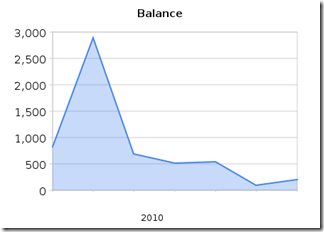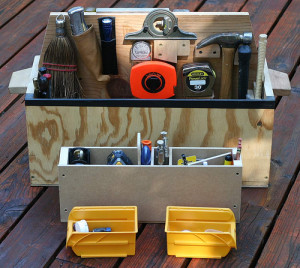 Coworker Ashok Amaran recounts his tale of how he found a coworking community and what it has meant to him.
Coworker Ashok Amaran recounts his tale of how he found a coworking community and what it has meant to him.
Inside the Numbers: P&L from Cincinnati Coworks
One of he pillars of coworking is Openness. Many space catalysts are often worried about business plans, finances, and expenses, and rightly so. Now, I’m not an accountant, but I can put together a spreadsheet. So in the spirit of openness, behold, I give you the Cincy Coworks P&L, year-to-date. Now, every situation is different, but hopefully this can help someone with their planning.
A little background: we were lucky enough to find a move-in ready retail space and negotiated a reasonable rent. So we had no build-out. Our primary start-up expense was furnishing the space and the kitchen.
 In the lower right-hand corner in the green cell, you can see our current bank balance. Clearly, we will not be retiring on Cincy Coworks anytime soon. But the good news is that we opened in the black, and have stayed in the black through 4 months, so we must be doing something right.
In the lower right-hand corner in the green cell, you can see our current bank balance. Clearly, we will not be retiring on Cincy Coworks anytime soon. But the good news is that we opened in the black, and have stayed in the black through 4 months, so we must be doing something right.
Our top expense is of course rent, followed by furniture, internet, and supplies. Important note: supplies on the P&L mostly refer to one-time purchases like the wi-fi router, power strips, and hardware. Consumables like paper towels, trash bags, and keeping the fridge stocked has been a 100% community effort by our members.
Other patterns: our revenue varied widely due to a surprising amount of turnover in the first few months. Our expenses varied because every time a new member joined in the beginning, we bought a desk. Our expenses also varied because, though I am a smart guy, I am not smart enough to figure out when our internet bill is due (thanks for nothing, Cincinnati Bell).
We would like to start a nest egg. If you are in the Cincinnati area, interested in joining?
Top 3 Coworking Resources You’re Not Using
Coworking is a state of mind, a community, and most importantly- a unique global movement. But figuring out how to get the most out of this rapidly expanding, concept of working can be difficult if you don’t know where to look.
By Angel Kwiatkowski
Coworking is a state of mind, a community, and most importantly- a unique global movement. But figuring out how to get the most out of this rapidly expanding, concept of working can be difficult if you don’t know where to look.
Coworking Google Group
This group acts as a support structure and discussion network amongst people interested in coworking on any level: as a catalyst, as a space owner or as a coworker. You’re welcome to lurk here, and learn silently from the knowledge and questions of others, but it’s even more of a resource if you introduce yourself and participate in the discussion. Learn more…
Coworking Wiki
If you’re looking for a place to cowork while traveling, or are just interested in watching and/or supporting the growth of the movement, this is the resource for you. Successful business models, best practices, and 700+ pages of user generated knowledge can be found on the Wiki, as well as information about the Coworking Visa Program, space directory, and coworking events list.
Global Coworking Blog
Want to share your experience about coworking in a new space? Want to find out what other coworkers are struggling with or challenged by? Got tips that all coworkers should be aware of? Share it on the blog. Press, announcements, and industry research can also be found on the Global Coworking Blog. In true coworking fashion, any and all coworkers are invited to submit posts to this page.
Image Credit: Flickr – usefulguy
Coworking Is a Competitive Advantage, Not Just an Expense.
Author Craig Baute
If you have been deterred from joining a local coworking facility because of their membership fees; don’t be because it will payback multiple times. Coworking and other shared workspaces provides a vibe of energy and community that motivates people to keep moving forward with their business and have the confidence to make bolder decisions. When people are surrounded by a diverse set of talents that are in a similar situation, being a freelancer or small company operator, the freedom to open up and share ideas is likely to occur and benefit all members.
Sharing Knowledge
This open sharing leads to thought-provoking conversations that will help form your business and product. The graphic designer a few seats down might suggest some new colors for your logo, and the marketing consultants across the table might be able to offer you a more focused strategy, while the SEO expert sitting next to you teaches you a bit more about keywords. All of these conversations won’t happen when sitting at home or the coffee house, but they will happen while coworking.
5-Minute Guidance
This access to free and open exchange of ideas is the competitive advantage that your rivals don’t have. An individual or small business has many questions about several small aspects of business, and the answers don’t require a three-hour sit down with an expensive consultant. Most individuals just need a professional to answer a question or point them in the right direction, something that normally takes 5 minutes or less. Coworking provides the community and connections to make these 5 minute conversations happen so people can operate their business with the resources of a company three times their size. It’s also important to note that coworking relationships go both ways and your opinion will be asked.
Coworking is an opportunity to share your knowledge and to learn from others. It’s more than a shared workspace and is a community of professionals and friends. The expenses of coworking should not be seen as a burden or unnecessary expense because of the benefits of the community. The knowledge and interesting people that will help support your business, the energetic atmosphere, and the new physical space is a competitive advantage that is hard to match.
Keep Coworking!
How To: Create a Local Meet-up Group for Freelancers
8 (easy!) steps for creating a local meet-up group for other freelancers and small business owners.
By Angel Kwiatkowski

Coworking naturally creates community—it’s the beauty of freelancers and independents working together in a shared office space. No doubt you’ve benefited from this coworking community goodness. But have you ever thought about having a group that is more focused on a niche you’re interested in? Here are 8 easy steps for how to create a local meet-up group for other freelancers and small business owners.
1. Choose a topic & purpose.
Who do you want to get together and why? Do you want to get freelance web designers together to talk about the latest Adobe Illustrator shortcuts, or would you rather get people from diverse professional backgrounds together to talk about a specific industry? There are limitless themes around which to organize a meet-up. Make it specific, but allow yourself some creativity! (For example, a meet-up named “Freelance Writers”? Boring. A meet-up named “Freelance Writers Who Care About Going Green”? That’s more like it!)
2. Ask two people to join you.
“Two?! Only two people?!” you shriek. Settle down. Ask two people who would fit the niche meet-up group to help you. For example, two other programmers if it’s for a programming group, or two other freelancers interested in non-profit organizations. Not only will having two other minds make choosing a time and venue easier, it will help diversify and grow the meet-up. And even if it’s just the three of you that end up attending the first meet-up, three people can do a lot of brainstorming and sharing.
3. Choose a time.
Check to ensure that your meet-up idea isn’t already happening somewhere in your area. If a similar group exists—great! Offer to join forces. If not, make sure your meet-up doesn’t conflict with other events in the area. Will the event be weekly, monthly or bimonthly? Will attendees likely have availability before, during or after work hours, or perhaps on the weekend?
4. Choose a venue.
Coffee shops, restaurants with private rooms and local community centers are a great place to find free or low-cost space for your group. But y’know what would be even better? Ask your coworking space if you can use the space during an off-time (evenings or weekends).
5. Set up an online event.
There are several online tools that allow you to share event description, time and venue with others. Make it simple for potential attendees to find the pertinent who/what/where/when/why info. Some easy-to-use online event tools include:
6. Share the event with your network.
- Post information about the meetup at your coworking space.
- Tell your friends on Facebook and your followers on Twitter.
- Talk about it on your blog.
- Announce it at other events you attend (but only if it’s relevant!).
- Share with your professional groups.
- Send an email to friends, former colleagues and anyone else in your network that seems like a perfect fit for the meet-up (especially if it’s someone that might not use Facebook or Twitter very often).
7. Be prepared.
If the meet-up group is hosted at your coworking space, do you want to provide snacks or refreshments? Or perhaps you’ll need a whiteboard & markers, a giant brainstorming notepad, or a laptop for taking notes and looking up websites. An LCD project and screen? Nametags and markers? Think again about the topic and purpose of the meet-up group, and ensure you have all the materials and “little things” needed to make it a great event.
8. Have fun!
The meet-up group you’ve helped create should be fun, information-rich and valuable for everyone involved. Enjoy it!
Why have a meet-up? Because it builds community. Because you can share resources, tips & tactics. Because you can help someone else by sharing your knowledge and skills. Because it’s awesome to hang out with other awesome people. (That’s awesomeness squared!)
Have you ever started a local meet-group? What worked and what didn’t? Tell us below in the comments!
Image Credit: Flickr – bump
